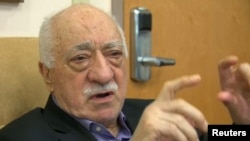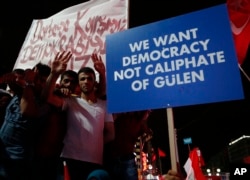The U.S.-based exiled cleric accused by President Recep Tayyip Erdogan of being behind Turkey's attempted coup has accused the Turkish president of "turning a failed putsch into a slow-motion coup of his own against constitutional government."
Writing Tuesday in the New York Times, Fethullah Gulen called Erdogan's accusation of involvement in the attempted coup by elements of Turkey's military earlier this month "irresponsible and wrong."
"My philosophy, inclusive and pluralist Islam dedicated to serve to human beings from every faith is antithetical to armed rebellion," wrote the 75-year-old cleric, a former Erdogan ally who has been living in self-imposed exile in the eastern U.S. state of Pennsylvania since 1999.
Ankara blames Gulen for the uprising that left 290 people dead, and is demanding his extradition.
Washington says it is considering documents Turkey sent about Gulen's alleged involvement in the failed coup, but has made no commitment to return him.
In his New York Times op-ed, Gulen accused Erdogan of seeking to transform Turkey from a parliamentary democracy into an executive presidency "essentially without checks on his power."
Gulen accused the Turkish president of having fired nearly 70,000 people from government agencies and further cracked down on civil society organizations, thereby "removing many of the remaining impediments to absolute power."
Under a three-month state of emergency that came into force last week, thousands of private educational institutions, hospitals, clinics and associations allegedly linked to Gulen have been ordered closed.
A decree issued Saturday allows judges, prosecutors and civil servants to be fired without the possibility of legal challenge, and police to detain some suspects for up to 30 days without being taken before a judge.
The New-Yorked based group Human Rights Watch on Tuesday called the decree "arbitrary, discriminatory, and unjustified."






